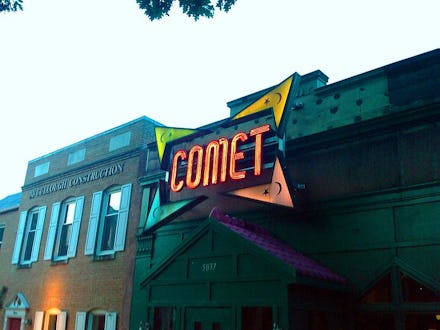The Comet Ping Pong "Pizzagate" gunman shows why fake news is more dangerous than ever

On Sunday, 28-year-old Edgar Maddison Welch walked into Washington, D.C.'s Comet Ping Pong pizza shop carrying an AR-15 assault rifle. He reportedly pointed the weapon at employees and fired it at least once in the store. An employee fled the store and contacted police, and Welch was arrested less than an hour later. Police found two other weapons — a Colt .38 handgun and a shotgun, one of which was in Welch's car.
Welch, of Salisbury, North Carolina, was charged with assault with a dangerous weapon. But even scarier than the attack was the reason he was there: to "self-investigate" a right-wing election conspiracy called Pizzagate.
What is "Pizzagate," anyway?
Pizzagate is an alt-right conspiracy theory falsely alleging that Hillary Clinton and her campaign chief were hiding a child-sex ring in a Washington family restaurant called Comet Ping Pong.
The Pizzagate theory started after WikiLeaks published leaked election-related emails from Clinton's campaign chairman John Podesta — one of which included correspondence with the owner of Comet Ping Pong regarding a fundraiser, the New York Times reported. From there, Trump supporters on the anarchic web forum 4chan began to spread the conspiracy theory that the Democratic Party and the pizza shop were running a child-sex ring. The false conspiracy theory grew as Pizzagate jumped from 4chan to Twitter to Reddit to Facebook. Reddit ended up banning all Pizzagate discussion.
According to the Washington Post, the restaurant's owner not only contacted the FBI and local police, but also reached out to Facebook and other social media companies to try to get the fake news stories removed from their platforms.
"Let me state unequivocally: These stories are completely and entirely false, and there is no basis in fact to any of them," a post on the Comet Ping Pong Facebook page reads. "What happened today demonstrates that promoting false and reckless conspiracy theories comes with consequences. I hope that those involved in fanning these flames will take a moment to contemplate what happened here today, and stop promoting these falsehoods right away."
"What happened today demonstrates that promoting false and reckless conspiracy theories comes with consequences."
Online misinformation is a serious problem — with frightening real-world consequences.
Pizzagate shows just how dangerous internet delusions can be if left to snowball without guardianship. When conspiracy theories and misinformation online don't stay confined to their digital parameters, they can lead to real-life violence.
And misinformation is spreading online more than ever, driven by a lucrative industry based on manipulating the public, made worse by Facebook's reluctance to police it. The need for social networks to get a better grasp of fake news is becoming more urgent — even President Barack Obama criticized the issue in November at a news conference in Berlin, name-dropping Facebook and television news as part of the problem.
"If we are not serious about facts and what's true and what's not, and particularly in an age of social media when so many people are getting their information in sound bites and off their phones, if we can't discriminate between serious arguments and propaganda, then we have problems," Obama said.
Facebook has finally addressed the public's cries for cracking down on misinformation, making it easier to report fake news on its platform. The tool is relatively new, so it remains to be seen how effective the reporting feature will be to curb the seemingly unquenchable wildfire of conspiracy theories.
The hidden danger of online hate speech
The Comet Ping Pong incident is an example of how fake news can have dangerous consequences in the post-election era. As hateful content has mushroomed online in the past year, so has an increase in hate-fueled violent acts. A report published in May 2014 showed that hate speech online against Muslims can encourage some to commit a violent act against them.
"When you have threatening comments online and they go unchecked, people start thinking it's acceptable," said Madihha Ahussain, the lead author of the report, as reported by the Washington Post. "And it doesn't take long to figure out that what becomes acceptable online becomes acceptable in the real world."
The report cites burgeoning Facebook pages featuring anti-Muslim rhetoric as examples of online spaces that might foster violence.
Still, CEO Mark Zuckerberg has been unwilling to see Facebook as an influential media platform. With conspiracy theories and hateful content growing online at an increasing rate, it's not only frustrating to see an internet titan avoid the responsibility of cleaning up his own platform — it's downright dangerous.